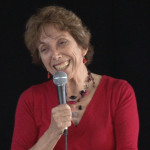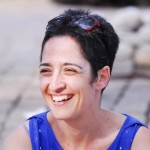My reading
Haftarah Parashat Noach
Isaiah 54:1 - 55:5
54:1 רָנִּ֥י עֲקָרָ֖ה לֹ֣א יָלָ֑דָה פִּצְחִ֨י רִנָּ֤ה וְצַהֲלִי֙ לֹא־חָ֔לָה כִּֽי־רַבִּ֧ים בְּֽנֵי־שׁוֹמֵמָ֛ה מִבְּנֵ֥י בְעוּלָ֖ה אָמַ֥ר יְהוָֽה׃
54:2 הַרְחִ֣יבִי׀ מְק֣וֹם אָהֳלֵ֗ךְ וִירִיע֧וֹת מִשְׁכְּנוֹתַ֛יִךְ יַטּ֖וּ אַל־תַּחְשֹׂ֑כִי הַאֲרִ֙יכִי֙ מֵֽיתָרַ֔יִךְ וִיתֵדֹתַ֖יִךְ חַזֵּֽקִי׃
54:3 כִּי־יָמִ֥ין וּשְׂמֹ֖אול תִּפְרֹ֑צִי וְזַרְעֵךְ֙ גּוֹיִ֣ם יִירָ֔שׁ וְעָרִ֥ים נְשַׁמּ֖וֹת יוֹשִֽׁיבוּ׃
54:4 אַל־תִּֽירְאִי֙ כִּי־לֹ֣א תֵב֔וֹשִׁי וְאַל־תִּכָּלְמִ֖י כִּ֣י לֹ֣א תַחְפִּ֑ירִי כִּ֣י בֹ֤שֶׁת עֲלוּמַ֙יִךְ֙ תִּשְׁכָּ֔חִי וְחֶרְפַּ֥ת אַלְמְנוּתַ֖יִךְ לֹ֥א תִזְכְּרִי־עֽוֹד׃
54:5 כִּ֤י בֹעֲלַ֙יִךְ֙ עֹשַׂ֔יִךְ יְהוָ֥ה צְבָא֖וֹת שְׁמ֑וֹ וְגֹֽאֲלֵךְ֙ קְד֣וֹשׁ יִשְׂרָאֵ֔ל אֱלֹהֵ֥י כָל־הָאָ֖רֶץ יִקָּרֵֽא׃
54:6 כִּֽי־כְאִשָּׁ֧ה עֲזוּבָ֛ה וַעֲצ֥וּבַת ר֖וּחַ קְרָאָ֣ךְ יְהוָ֑ה וְאֵ֧שֶׁת נְעוּרִ֛ים כִּ֥י תִמָּאֵ֖ס אָמַ֥ר אֱלֹהָֽיִךְ׃
54:7 בְּרֶ֥גַע קָטֹ֖ן עֲזַבְתִּ֑יךְ וּבְרַחֲמִ֥ים גְּדֹלִ֖ים אֲקַבְּצֵֽךְ׃
54:8 בְּשֶׁ֣צֶף קֶ֗צֶף הִסְתַּ֨רְתִּי פָנַ֥י רֶ֙גַע֙ מִמֵּ֔ךְ וּבְחֶ֥סֶד עוֹלָ֖ם רִֽחַמְתִּ֑יךְ אָמַ֥ר גֹּאֲלֵ֖ךְ יְהוָֽה׃
54:9 כִּי־מֵ֥י נֹ֙חַ֙ זֹ֣את לִ֔י אֲשֶׁ֣ר נִשְׁבַּ֗עְתִּי מֵעֲבֹ֥ר מֵי־נֹ֛חַ ע֖וֹד עַל־הָאָ֑רֶץ כֵּ֥ן נִשְׁבַּ֛עְתִּי מִקְּצֹ֥ף עָלַ֖יִךְ וּמִגְּעָר־בָּֽךְ׃
54:10 כִּ֤י הֶֽהָרִים֙ יָמ֔וּשׁוּ וְהַגְּבָע֖וֹת תְּמוּטֶ֑נָה וְחַסְדִּ֞י מֵאִתֵּ֣ךְ לֹֽא־יָמ֗וּשׁ וּבְרִ֤ית שְׁלוֹמִי֙ לֹ֣א תָמ֔וּט אָמַ֥ר מְרַחֲמֵ֖ךְ יְהוָֽה׃
54:11 עֲנִיָּ֥ה סֹעֲרָ֖ה לֹ֣א נֻחָ֑מָה הִנֵּ֨ה אָנֹכִ֜י מַרְבִּ֤יץ בַּפּוּךְ֙ אֲבָנַ֔יִךְ וִיסַדְתִּ֖יךְ בַּסַּפִּירִֽים׃
54:12 וְשַׂמְתִּ֤י כַּֽדְכֹד֙ שִׁמְשֹׁתַ֔יִךְ וּשְׁעָרַ֖יִךְ לְאַבְנֵ֣י אֶקְדָּ֑ח וְכָל־גְּבוּלֵ֖ךְ לְאַבְנֵי־חֵֽפֶץ׃
54:13 וְכָל־בָּנַ֖יִךְ לִמּוּדֵ֣י יְהוָ֑ה וְרַ֖ב שְׁל֥וֹם בָּנָֽיִךְ׃
54:14 בִּצְדָקָ֖ה תִּכּוֹנָ֑נִי רַחֲקִ֤י מֵעֹ֙שֶׁק֙ כִּֽי־לֹ֣א תִירָ֔אִי וּמִ֨מְּחִתָּ֔ה כִּ֥י לֹֽא־תִקְרַ֖ב אֵלָֽיִךְ׃
54:15 הֵ֣ן גּ֥וֹר יָג֛וּר אֶ֖פֶס מֵֽאוֹתִ֑י מִי־גָ֥ר אִתָּ֖ךְ עָלַ֥יִךְ יִפּֽוֹל׃
54:16 הן [הִנֵּ֤ה] אָֽנֹכִי֙ בָּרָ֣אתִי חָרָ֔שׁ נֹפֵ֙חַ֙ בְּאֵ֣שׁ פֶּחָ֔ם וּמוֹצִ֥יא כְלִ֖י לְמַעֲשֵׂ֑הוּ וְאָנֹכִ֛י בָּרָ֥אתִי מַשְׁחִ֖ית לְחַבֵּֽל׃
54:17 כָּל־כְּלִ֞י יוּצַ֤ר עָלַ֙יִךְ֙ לֹ֣א יִצְלָ֔ח וְכָל־לָשׁ֛וֹן תָּֽקוּם־אִתָּ֥ךְ לַמִּשְׁפָּ֖ט תַּרְשִׁ֑יעִי זֹ֡את נַחֲלַת֩ עַבְדֵ֨י יְהוָ֧ה וְצִדְקָתָ֛ם מֵאִתִּ֖י נְאֻם־יְהוָֽה׃
55:1 ה֤וֹי כָּל־צָמֵא֙ לְכ֣וּ לַמַּ֔יִם וַאֲשֶׁ֥ר אֵֽין־ל֖וֹ כָּ֑סֶף לְכ֤וּ שִׁבְרוּ֙ וֶֽאֱכֹ֔לוּ וּלְכ֣וּ שִׁבְר֗וּ בְּלוֹא־כֶ֛סֶף וּבְל֥וֹא מְחִ֖יר יַ֥יִן וְחָלָֽב׃
55:2 לָ֤מָּה תִשְׁקְלוּ־כֶ֙סֶף֙ בְּֽלוֹא־לֶ֔חֶם וִיגִיעֲכֶ֖ם בְּל֣וֹא לְשָׂבְעָ֑ה שִׁמְע֨וּ שָׁמ֤וֹעַ אֵלַי֙ וְאִכְלוּ־ט֔וֹב וְתִתְעַנַּ֥ג בַּדֶּ֖שֶׁן נַפְשְׁכֶֽם׃
55:3 הַטּ֤וּ אָזְנְכֶם֙ וּלְכ֣וּ אֵלַ֔י שִׁמְע֖וּ וּתְחִ֣י נַפְשְׁכֶ֑ם וְאֶכְרְתָ֤ה לָכֶם֙ בְּרִ֣ית עוֹלָ֔ם חַֽסְדֵ֥י דָוִ֖ד הַנֶּאֱמָנִֽים׃
55:4 הֵ֛ן עֵ֥ד לְאוּמִּ֖ים נְתַתִּ֑יו נָגִ֥יד וּמְצַוֵּ֖ה לְאֻמִּֽים׃
55:5 הֵ֣ן גּ֤וֹי לֹֽא־תֵדַע֙ תִּקְרָ֔א וְג֥וֹי לֹֽא־יְדָע֖וּךָ אֵלֶ֣יךָ יָר֑וּצוּ לְמַ֙עַן֙ יְהוָ֣ה אֱלֹהֶ֔יךָ וְלִקְד֥וֹשׁ יִשְׂרָאֵ֖ל כִּ֥י פֵאֲרָֽךְ׃










